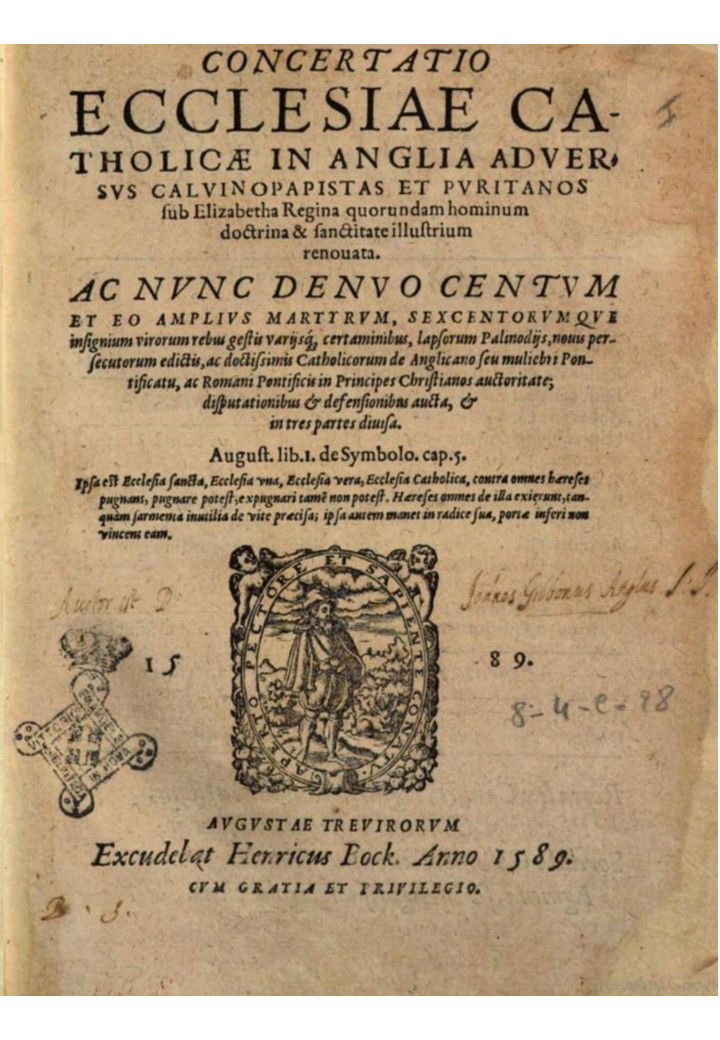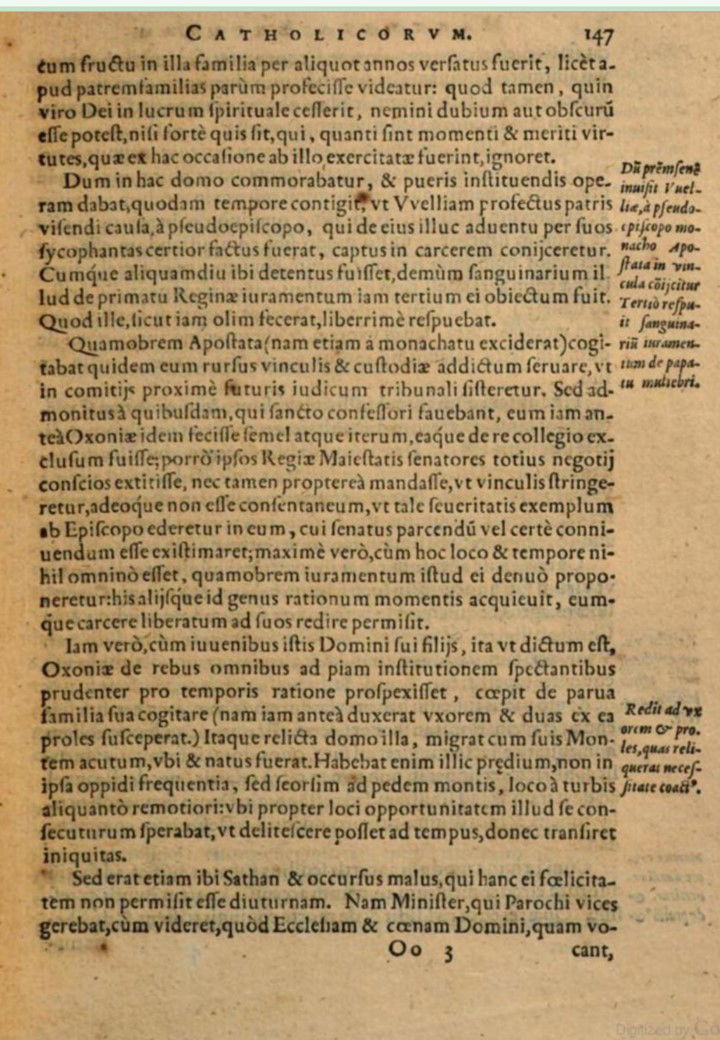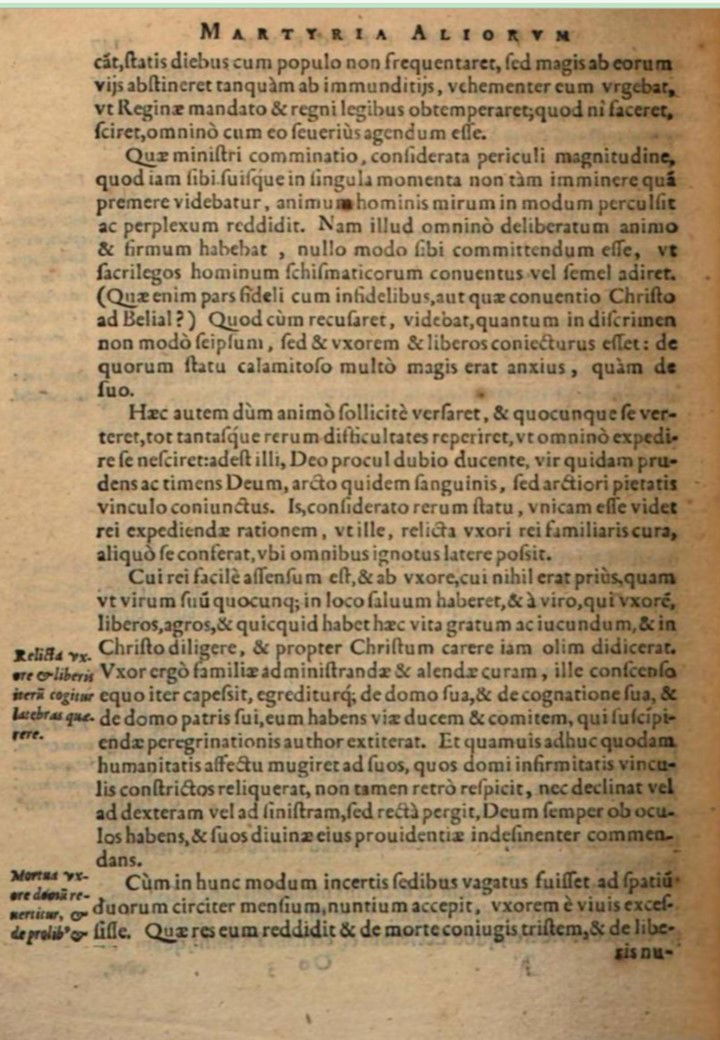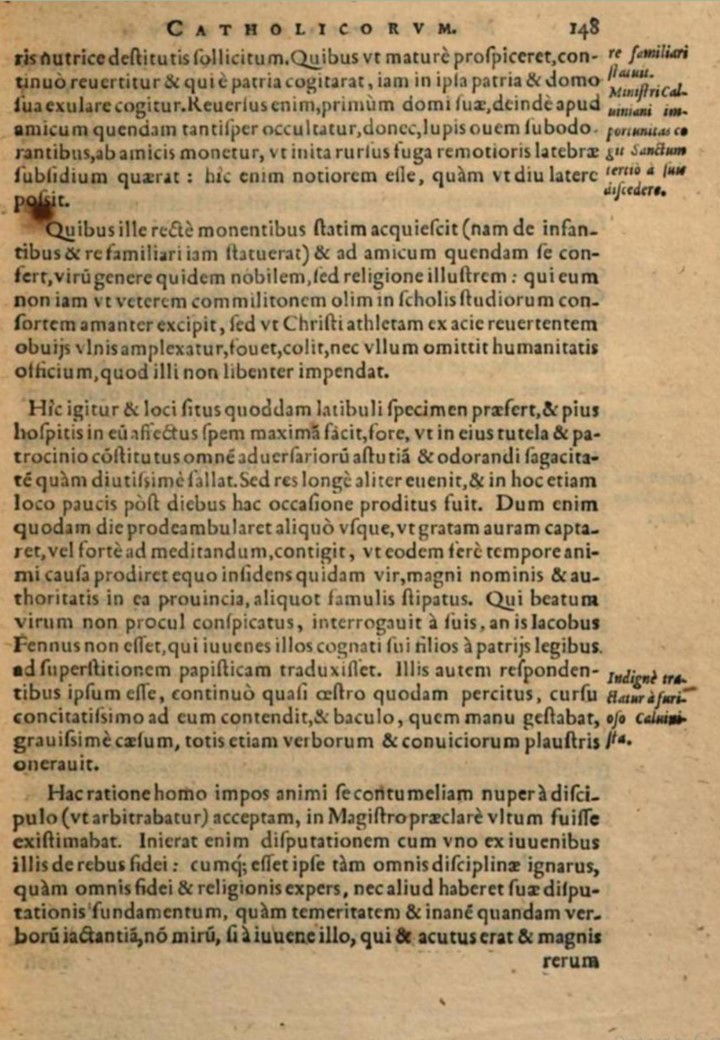Blessed James Fenn, a Montacute Martyr (c.1540-1584)
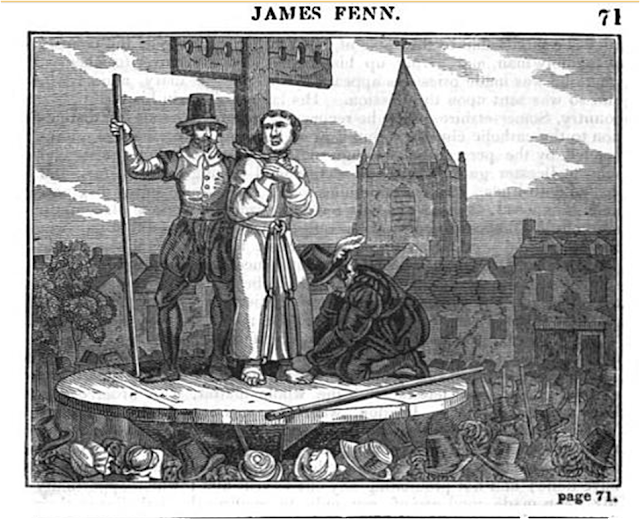
[Image from https://saintscatholic.blogspot.com/2017/02/blessed-james-fenn.html]
Montacute-born James Fenn (Venn) was one of the 158 Catholic priests trained at Douai, France, who were executed for treason between 1577 and 1680 (the Martyrs of Douai). He must have come from a wealthy household because he was a student and then a Fellow at Oxford; I would like to discover where he lived in Montacute. He was dismissed from Oxford when the rules about Catholicism changed, and he became a tutor in Somerset, probably still living in the South Somerset area. He married and had 2 children, then when his wife died he went to France to study for the priesthood. Wikipedia says he is remembered on 12 February which is the anniversary of his death and a Vatican matirilogio gives his Latinised name, Giacomo Fenn, with a date of 12 February. I have also seen 29 October and 1 December as a remembrance dates).
In 1570 Elizabeth I (reigned 1558-1603) was excommunicated by Pope Pius V, absolving her Catholic subjects of their allegiance to her. In response Elizabeth I made it high treason for any Jesuit or any seminary priest to be in England and a felony for any person to help them. (Jesuits are members of the Roman Catholic 'Society of Jesus', an order of priests founded in 1534 to do missionary work opposing the Reformation). From the 1560s the University of Douai was a centre for the education of English Catholics escaping persecution in England, and included the English College, and also Irish and Scottish colleges and Benedictine, Franciscan and Jesuit houses.
James Fenn was Martyred after being hung, drawn and quartered at Tyburn (in London on the present-day site of Marble Arch) on 12th February 1584. A Martyr is someone the Pope recognises as having "died voluntarily as a witness of the Faith or in an act of heroic charity for others".
The following account of the life of James Fenn has been taken from https://englishcatholichistoryassoc.files.wordpress.com/2017/03/newsletter-march-2017.pdf, which credits the history to https://www.rc-churchyeovil.org/, however I can't find it on their website. This biography uses the surname Venn in the title and Fenn in the body of the text; in the 1500s writing will have been phonetic and both versions of the name sound similar so the spelling was probably interchangeable. Although I can't trace of the name 'Fenn' locally, Venn is a local surname.
The Life and Death of Blessed James Venn
James Fenn (born circa 1540) appears to have come from a respectable Catholic family, with his brothers John and Robert becoming priests in their lifetimes. Born in Montacute, James won admittance to study at New College, Oxford, through his impressive singing performance as a chorister. He was noted for his gentleness and good humour. Later he was made scholar and fellow of Corpus Christi College. At his graduation to receive his BA, removing his hood he retorted that he would never be guilty of obtaining any temporal honour at the price of his eternal salvation. During this turbulent period, the Privy Council had allowed Catholic candidates of Oxford University to receive their degrees without taking the Oath of Supremacy, but this local suspension of the Act of Succession was short-lived. Refusing to take the oath, Fenn was removed from office at Oxford University.
Continuing to privately tutor pupils after his dismissal at Gloucester Hall, James Fenn married, his wife given birth to two children (a boy and a girl). Spending some time in his village of birth, he was forced into hiding when the local vicar challenged him regarding his absence at the Anglican services. His wife died suddenly during this time, and after a couple of months he returned to Montacute, living in concealment through the help of a friend. He was later employed by an “eminent Catholic Gentleman" (Sir Nicholas Poyntz) in Gloucester. It appears that Fenn was influential on the youths he tutored, and there is record of a least one coming to the Catholic Faith upon witnessing his martyrdom. Sir Nicholas recalled that the manner in which Fenn carried out his daily duties made his whole life a perpetual sermon exhorting virtue and piety to all.
In 1579, following the earlier death of his wife, and because of James’ “Excellent qualifications and rare virtues", he was encouraged to consider the priestly ministry. Trained at Rheims, he was ordained relatively quickly as a priest in April 1580 and returned to his home county of Somerset to minister secretly here. However, this stay was short. He was found a Catholic, and was arrested close to the Manor House of Brympton d'Evercy. Despite this, it is noted that he reconciled several persons of distinction to the Catholic Faith before his imprisonment.
He was taken to Ilchester Prison. Held in the stocks on the market day, his ''invincible patience, modest countenance and tranquil soul'' caused many to reflect more deeply into their own faith (rather than shaming Fenn as intended). The onlookers saw something worthy of admiration in James Fenn, and this reaction angered the authorities. By September 1581 he was in Marshalsea Prison in Southwark. It appears that Fenn's priestly identity was unknown to his prosecutors, and as such he was enabled to minister to his fellow prisoners for about 3 years. He utilised his time in prison well - spending it in prayer and other spiritual exercises as well as in leading pirates and other serious criminals back to God. Upon his priesthood being exposed, a demonstrably false charge of a plot against the Queen was generated against Fenn and four other priests, which led to his being taken to the Tower of London.
Much ought to be said of the martyrdom itself. On the morning of the 12th February 1584, when he was already laid on the hurdle at Tower Gate, he looked up, and recognized his little daughter, Frances, standing in the crowd. She was weeping bitterly, but he kept his habitual calm and peaceful expression, as, lifting his pinioned hands so far as possible, he gave her both his parental and priestly blessing, and then was drawn away. Fenn prayed at the gallows itself, though refused the consolation of a Protestant minister ("I am not to be taught my duty by you."). Questioned on the accused charge of treason, he reiterated that he had never wished to harm the Queen by so much as a pin-prick and willingly gave all due obedience to her in worldly matters (but not in spiritual matters). Immediately before being hanged, he commended himself and the Queen to God's mercy.”
I understand this account was originally written and published by the Church of the Holy Ghost, Yeovil.
Encyclopedia.com provides the following bibliography for the life of James Fenn:
R. Challoner, Memoirs of Missionary Priests, ed. J. H. Pollen (rev. ed. London 1924; repr. Farnborough 1969).
H. Foley, Records of the English Province of the Society of Jesus, 7 v. (London 1877–82) 74, 103.
Gillow, Biblical Dictictionary of English Catholicism, (London and New York 1885–1902) III, 202; cf. III, 265; V, 142, 201.
J. H. Pollen, Acts of English Martyrs (London 1891) 252, 253, 304.
Source material
As far as I can see, the majority of these works listed above use a 1589 publication by John Bridgewater as their source (Concertatio ecclesiae catholicae in Anglia.... ). The following are the pages which mention Montacute and James's wife and sons; according to Google translate, James Fenn had an estate in Mount Acutus, where he had been born, "not in the town itself, but separately at the foot of the mountain, in a place away from the crowds." Could this indicate Under Warren? However I lost faith in Google translate when it told me that after he left Montacute and after his wife had died he was attacked by wolves and frogs....
